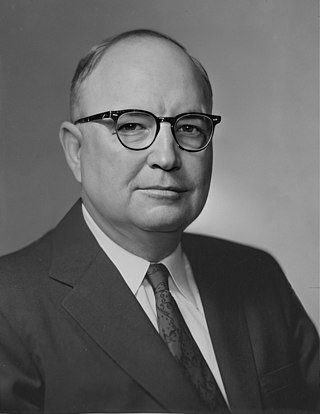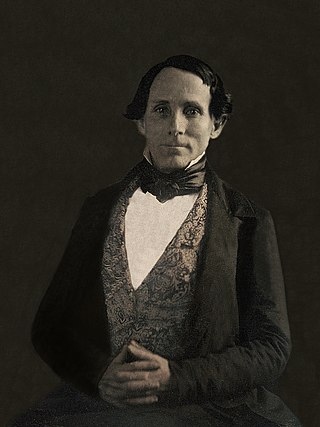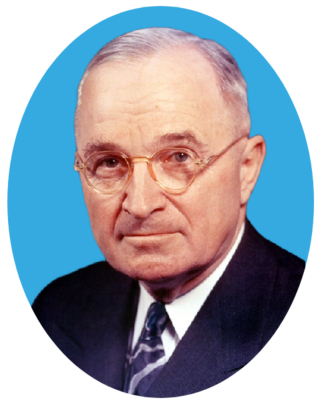
The 1832 United States presidential election was the 12th quadrennial presidential election, held from Friday, November 2 to Wednesday, December 5, 1832. Incumbent president Andrew Jackson, candidate of the Democratic Party, defeated Henry Clay, candidate of the National Republican Party.

James Oliver Eastland was an American attorney, plantation owner, and politician from Mississippi. A Democrat, he served in the United States Senate in 1941 and again from 1943 until his resignation on December 27, 1978. Eastland was a segregationist who led the Southern resistance against racial integration during the civil rights movement, often speaking of African Americans as "an inferior race." Eastland has been called the "Voice of the White South" and the "Godfather of Mississippi Politics."

Oxford is the 14th most populous city in Mississippi, and the county seat of Lafayette County, 75 miles (121 km) southeast of Memphis. A college town, the University of Mississippi or "Ole Miss" is adjacent to the city. Founded in 1837, it is named for Oxford, England.

Chester Trent Lott Sr. is an American lobbyist, lawyer, author, and politician who represented Mississippi in the United States House of Representatives from 1973 to 1989 and in the United States Senate from 1989 to 2007. Lott served in numerous leadership positions in both chambers of Congress as one of the first of a wave of Republicans winning seats in Southern states that had been solidly Democratic. Later in his career, he served twice as Senate Majority Leader, and also, alternately, Senate Minority Leader. In 2003, he stepped down from the position after controversy due to his praising of Senator Strom Thurmond's 1948 segregationist Dixiecrat presidential bid.

Lucius Quintus Cincinnatus Lamar II was a Confederate soldier, American politician, diplomat, and jurist. A member of the Democratic Party, he represented Mississippi in both houses of Congress, served as the United States Secretary of the Interior, and was an associate justice of the Supreme Court of the United States. He also served as an official in the Confederate States of America.

Ross Robert Barnett was an American politician and segregationist who served as the 53rd governor of Mississippi from 1960 to 1964. He was a Southern Democrat who supported racial segregation.

Fielding Lewis Wright was an American politician who served as the 19th lieutenant governor and 49th and 50th governor of Mississippi. During the 1948 presidential election he served as the vice presidential nominee of the States' Rights Democratic Party (Dixiecrats) alongside presidential nominee Strom Thurmond. During his political career he fought to maintain racial segregation, fighting with President Harry S. Truman over civil rights legislation, and holding other racist views.

Henry Stuart Foote was a United States Senator from Mississippi and the chairman of the United States Senate Committee on Foreign Relations from 1847 to 1852. He was the Unionist Governor of Mississippi from 1852 to 1854 and an American Party supporter in California. During the American Civil War, he served in the First and Second Confederate Congresses. A practicing attorney, he published two memoirs related to the Civil War years, a book on Texas before its annexation and a postwar book on the legal profession and courts in the Southern United States.

The 1948 Democratic National Convention was held at Philadelphia Convention Hall in Philadelphia, Pennsylvania, from July 12 to July 15, 1948, and resulted in the nominations of President Harry S. Truman for a full term and Senator Alben W. Barkley of Kentucky for vice president in the 1948 presidential election.

Edythe Evelyn Gandy was an American attorney and politician who served as Lieutenant Governor of Mississippi from 1976 to 1980. A Democrat who held several public offices throughout her career, she was the first woman elected to a statewide constitutional office in Mississippi. Born in Hattiesburg, she attended the University of Mississippi School of Law as the only woman in her class. Following graduation, she took a job as a research assistant for United States Senator Theodore Bilbo. She briefly practiced law before being elected to the Mississippi House of Representatives, where she served from 1948 to 1952. Defeated for re-election, she worked as director of the Division of Legal Services in the State Department of Public Welfare and Assistant Attorney General of Mississippi until she was elected State Treasurer of Mississippi in 1959.
The Council of Federated Organizations (COFO) was a coalition of the major Civil Rights Movement organizations operating in Mississippi. COFO was formed in 1961 to coordinate and unite voter registration and other civil rights activities in the state and oversee the distribution of funds from the Voter Education Project. It was instrumental in forming the Mississippi Freedom Democratic Party. COFO member organizations included the National Association for the Advancement of Colored People.

The Mississippi Democratic Party is the affiliate of the Democratic Party in the state of Mississippi. The party headquarters is located in Jackson, Mississippi.

The 1980 United States presidential election in Mississippi took place on November 4, 1980. All fifty states and The District of Columbia were part of the 1980 United States presidential election. Mississippi voters chose seven electors to the Electoral College, who voted for president and vice president.
Ralph Edwin King Jr., better known as Ed King, is a United Methodist minister, civil rights activist, and retired educator. He was a key figure in historic civil rights events taking place in Mississippi, including the Jackson Woolworth’s sit-in of 1963 and the Freedom Summer project in 1964. Rev. King held the position of chaplain and dean of students, 1963–1967, at Tougaloo College in Jackson, Mississippi. At this critical juncture of the civil rights movement, historian John Dittmer described King as “the most visible white activist in the Mississippi movement.”

The 1968 United States presidential election in Mississippi was held on November 5, 1968. Mississippi voters chose seven electors, or representatives to the Electoral College, who voted for President and Vice-President. During the 1960s, the Civil Rights Movement dictated Mississippi's politics, with effectively the entire white population vehemently opposed to federal policies of racial desegregation and black voting rights. In 1960, the state had been narrowly captured by a slate of unpledged Democratic electors, but in 1964 universal white opposition to the Civil Rights Act and negligible black voter registration meant that white Mississippians turned almost unanimously to Republican Barry Goldwater. Goldwater's support for "constitutional government and local self-rule" meant that the absence from the ballot of "states' rights" parties or unpledged electors was unimportant. The Arizona Senator was one of only six Republicans to vote against the Civil Rights Act, and so the small electorate of Mississippi supported him almost unanimously.

The 1960 United States presidential election in Mississippi took place on November 8, 1960, as part of the 1960 United States presidential election. Voters chose eight representatives, or electors to the Electoral College, who voted for president and vice president. This was the last election in which Mississippi had eight electoral votes: the Great Migration of Black Americans caused the state to lose congressional districts for the third time in four censuses before the next election.

The 1956 United States presidential election in Mississippi was held on November 6, 1956. Mississippi voters chose eight representatives, or electors to the Electoral College, who voted for president and vice president.
Raymond Birchett was an American architect. He designed commercial and school buildings in Mississippi, including several buildings on the campus of Mississippi Valley State University.















